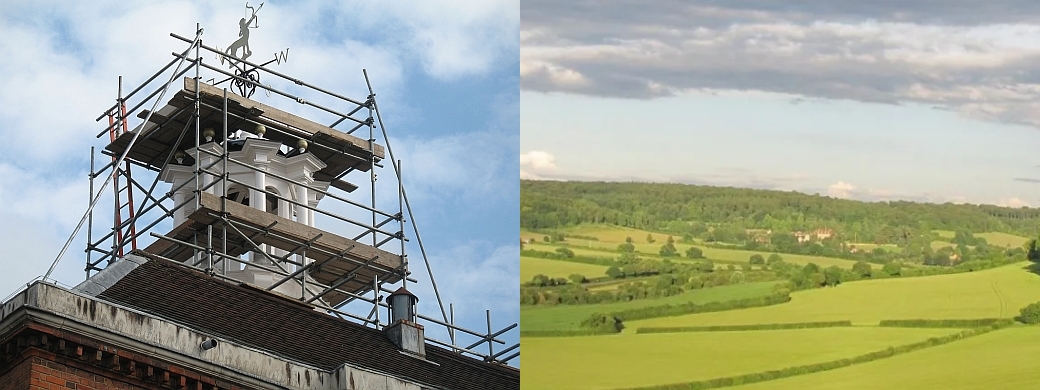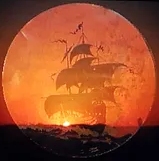
In the spring and summer of this year 2006 I opened all my senses, not just the usual five, to Nature. I’m searching here for an adequate word, but Nature will have to do. I exposed myself to the sublime and intricate world of non-human life, its pathos and grandeur.
I discovered that lambs and horses and young bulls don’t want to be patted or stroked like dogs or cats. They want to look at you, sniff you; and if they begin to accept you they might lick your proffered hand. These are some of their ways of knowing.
I saw how seeds, shoots, buds, blossoms, leaves and branches adjust their unfolding to the seasons, according to their intrinsic wisdom. They plan, they take chances, they adapt. Nature is intelligent to the finest detail; but endearingly, it’s not perfect.
I saw inexplicable beauty, like the variously-coloured patches on chestnut blossom, and wondered how much it was in the eye of the beholder. And whose eye: the bee’s as well as mine? I surmised that the colours and patterns on the caterpillars of the cinnabar and mullein moths, and the peacock butterfly, were designed as camouflage against a background of ragwort, mullein and nettles respectively: but only to a bird’s eye view.
It’s easy to make a rational account of observations perceived with the basic five senses. What of those other senses to which I alluded in my first sentence? Obscure memories, which tinge our reaction to the present, are a kind of sense too. The sights, sounds and smells that I’ve seen this year have stirred long-forgotten episodes in my own life, notably when I was four and five years old. I left Australia and for six weeks a ship was my mother. I survived the hard winter of 1947 in my grandparents’ bomb-damaged house; and when I’d got used to England, I was placed with an “aunt” in Holland, where I roamed unfettered, exploring the world alone much as I’ve been doing this year. Life is full of echoes.
Does memory extend beyond our own lifetime to the world of our ancient predecessors, who trod the same woodland paths, alert for the slightest movement of predator or prey? When I’ve exposed my silhouette on the ridge of rolling hills behind Amersham, I’ve been conscious that my ancestors would do the same only when they were sure that no enemies lurked. Or perhaps my ecstasies when following ancient trails have nothing to do with any of the above.
Now that the leaves are half-fallen, so late this year, with the ground soggy rather than hard with frost, I tend to walk more in the town. Instead of submerging myself in Nature, I take strolls amongst my own kind, and consider the human condition, which speaks to me just as the blossoms, and the raiment of caterpillars, and the young bulls’ curious tongues did. And what does it speak? O how can I possibly say? I am life’s student, not its professor!
PS There this might have ended, if I hadn’t taken a walk to the shop where my elderly sick computer was being fixed. Though it was only 3pm, the sun was low in the sky setting the windows ablaze on the hillside they call “The Pastures” behind my house. I was at the spot, by an oily taxi repair yard, where flashes of understanding have hit before.
All at once I felt the pathos of the human condition. Awed, I suddenly saw what makes us different. Animals spend their days in survival, but they know what to do. Humans face a bigger task. Every day, each one of us has to work out how to live. We cannot do it for one another and we have to work it out afresh daily.
We never cease from seeking solutions to this practical problem, but like cloud-formations they are numberless, constantly swelling, swirling and dissolving into the blue.


Hullo! I'm back to blog-reading after my recent travel! Best, rama
LikeLike
Hi Vincent, the on-line link to the docu “Being Indian” is:
http://www.rockhopper.tv/home.php?zid=2&sec=11&id=31
Best, rama
LikeLike
walking meditations… nature teaches us all.
LikeLike
i was awed by this piece Vincent. so refined, so beautifu, so serene.
i guess, i should not comment on the content. the whole package was so surreal. you are an awesome writer friend.
LikeLike
Hi Vincent
I just starting reading the works of Chuang Tzu ..what you are saying here is very similar to what Chuang Tzu was saying about the gardener. The human condition. The more we humans try to work it out on how to live we lose touch with the pure and simple. can we live in a world of technology and still keep it simple?
your post here is beautiful. your observations and your connection to spirit.
LikeLike
“Every day, each one of us has to work out how to live. We cannot do it for one another and we have to work it out afresh daily.
We never cease from seeking solutions to this practical problem, but like cloud-formations they are numberless, constantly swelling, swirling and dissolving into the blue.”
I like this very much.
LikeLike
I wonder if, in our having to figure things out fresh each day, we are not more like wild animals than their domesticated kin? Survival means different things when you need to make use of random offerings each day, rather than moseying over to the grain, or grazing on the farmers cultivated pasture.
LikeLike
Very interesting line of thought, Hayden. I imagine that domesticated animals have adjusted over the millennia to their more secure status—at least till the trip to the slaughterhouse. But it's also been surmised that domesticated animals (farm or pet) are psychologically stuck in a dependent childhood state, together with certain physiological indications of the same.
At school I was taught the life-cycle of the salmon, which involved huge journeys from spawning in the upper reaches of Scottish rivers (where the fish leap up the rapids) to mating in the Sargasso Sea. I've no idea how they can cope with being fish-farmed these days. Perhaps those huge journeys have become their Dreamtime, a phylogenetic memory of the species, the bed-time story of the baby salmon, where once it was the actuality.
As humans, we seem to have three modes: survival, which may be a little like wild species; domestication, in which our physical needs are met but we are preoccupied in existential concerns; and sleepwalking, in which we choose to quieten the existential angst with various “drugs”, which society so conveniently makes available.
LikeLike
awesome…I visited your blog first time. You are a terrific writer. You give vivid description of experiences and events. I am looking forward to read your next posting.
LikeLike
[…] All the same, I do try to say things for myself, such as this: In the spring and summer of this year 2006 I opened all my senses, not just the usual five, to Nature. I’m searching here for an adequate word, but Nature will have to do. I exposed myself to the sublime and intricate world of non-human life, its pathos and grandeur. [my post on The Human Condition] […]
LikeLike